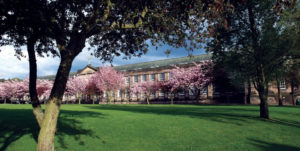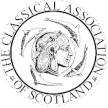If you are anything like me, then the start of a new school year was extremely exciting; new stationery which defined the ‘new you’ and all of that personal (and physical) growth you had achieved over the summer, a new wardrobe with your own take on the prescribed uniform, and new classes and teachers. New. Going to university, this excitement only heightened. A new wardrobe without restrictions, classes on topics you hadn’t even heard of, new people from new countries, and invariably, a new home to boot. As a PhD student, summer is often a less little pressurised than the rest of the year, but it is still a time for work. The ‘new semester’ sparkle is dulled a little. Continuation, not new. Yet, the autumn months, for me, always hold that magical atmosphere of cosy comforts and exciting opportunities; of the new, and the traditional. I was surprised, then, when I took a course this summer, that I awoke on the Monday morning with all the excitement, anticipation, and nervousness of that first day of school feeling of my youth (and yes, I did buy new stationery for the occasion!)
When I started my PhD I knew I would need to tackle Greek. The further into my studies I ventured, the more often that pesky Iliadwould turn up. This summer was the moment to strike. Classics has a notorious reputation for being elitist, and in part, this is because of the language qualifications in Latin and Greek. Most state schools don’t offer these languages anymore, meaning that those who have the opportunity to study these classes often come from more privileged backgrounds. This is certainly starting to change, and most Classics departments are sympathetic to the difficulty posed by many students in gaining these languages. Many departments in Britain don’t expect students to have Latin and Greek before starting, offering a number of ways to study languages – if you choose to – while at university. If, like me, you were (or are) joint honours, finding space in your timetable for these classes can be difficult, which is why summer schools are such a fantastic option. I recently spoke to Prof. Mary Beard about accessibility in Classics (more on this in a later post!) and the concern surrounding ancient languages as a ‘gate keeper’ to the privileged world of the Classics. Prof. Beard pointed out that languages are no longer a means of exclusion, with so many different ways to gain languages if you want to. I would add a few caveats to this optimism, however; firstly, summer schools meaning giving up at least a week of your summer. This means, for many, finding childcare or taking time off of work. Secondly, these schools are expensive, and taking the first concern into account, this can be added to by the cost of childcare, travel, seeking accommodation, etc. However, many Classicists are aware of these pressures (including Prof. Beard) and are seeking ways to minimise these concerns for students. Chief among these are Dr. Alex Imrie and Dr. Sam Newington, who this year launched the Classical Association of Scotland Greek and Latin Summer School (CAS). Aware of the above concerns, my supervisor was the one to suggest that I try the new language school starting in Edinburgh. In its inaugural year, this new school was only a week long, non-residential, and a short walk from my department. It seemed like a good place to start.

George Watson’s College, where CAS was hosted this summer
CAS offered a number of scholarships, and as a non-residential school, the price of the week was already considerably lower than many of the alternatives. While I opted to buy my own books, this wasn’t essential, and they offered all of the resources from free. Hosted in the beautiful George Watson’s College, with its old wooden floors and echoing corridors, Dr. Imire and Dr. Newington alongside the tutors, struck the perfect balance between intensive academic atmosphere, and a relaxed, collegial environment. The range of classes were extensive, with substantial breaks in between to allow for networking, extra study, and some much needed downtime. On top of this, CAS offered a range of mini courses and excursions, including an introduction to Hebrew and Egyptology and a guided tour of the National Museum of Scotland. Within 6 days, CAS covered over half a semester of language tuition and the tutors provided invaluable support and resources throughout.
The group, split into subject and levels, was relatively small, but wonderfully diverse, including PhD students, undergraduates, mature students, and those just wanting to brush up on skills they had learned at school. While all measures were taken to make the school as financially accessible as possible, I did feel that there was room to squeeze in another class each day, rather than such extensive break periods. However, all in all, I have only praise for the CAS course, and appreciate that they struck a balance of taster sessions and lectures on top of language skills, to cater to the wider variety of attendees. Obsessive language cramming was not the aim of the CAS course, but rather an accessible, open forum for those wishing to learn language skills also side those seeking more insight into Classics as a field, an aim they achieved with great success.
A few weeks ago, I found myself in a lecture being able to transliterate the Greek alphabet in my head, and therefore make sense of many of the words. This freeing and empowering moment really brought home to me just how much I had learnt at CAS, more than I could have hoped for when I signed up. However, while I went to learn Greek – and did so, I might add! – what was most striking about my CAS experience, was not the classes but those involved. Dr. Imrie’s concern and excitement for all attendees was clear throughout, and he made CAS a welcoming environment from start to finish. The sheer enthusiasm which perpetually radiates from Dr. Newington was marvellous to behold. The clear love and devotion of both for their field was just the inspiration I needed as I prepared to start my third year of PhD research, and for that, I am eternally grateful.
Going back to being a student was precisely what I needed as I began to feel the mid-PhD-slump. More importantly, it was a welcome reminder of how frightening and exciting being a student can be, ahead of tutoring my own sessions later this academic year. While the chaos and antics of Freshers Week might seem frustrating or inconvenient as you pour your eighth cup of coffee and stare at that never-ending-chapter-of-hell from your PhD room, I hope you all find a small moment in the coming month to feel the excitement and enthusiasm of being a student again, and the magical atmosphere of the autumn term. Afterall, it’s a new semester.
For more information on CAS see; https://cassummerschool.weebly.com/course-details.html



Leave a Reply